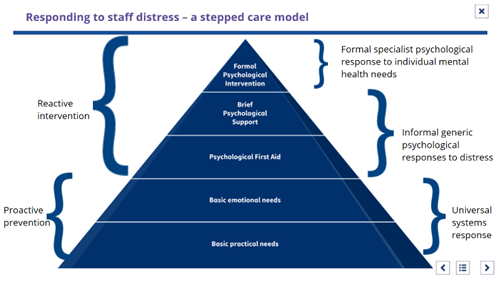Meeting the mental health needs of the workforce

Meeting the mental health needs of the workforce
This year brought the mental health and wellbeing needs of our health and social care workforce into a new focus.
Mental health has been a priority for us as an organisation for some time, but 2020 has given it new importance. NES has a strong record of producing quality, evidence-based mental health and wellbeing resources and training, tailored to a range of staff and underpinned by implementation science.
These resources are for everyone, from specialist psychological therapists, providing treatment for complex mental health difficulties to all staff supporting the mental health and wellbeing of the Scottish population that they serve. This includes building staff confidence to adapt to the needs of service users with dementia, autism/neurodevelopmental difficulties or trauma.
This background meant we were well placed to respond to the Covid crisis, developing a stepped care approach supporting proactive and reactive planning for our partners.

The Scottish Government has recognised this work as contributing to recovery and renewal approach, noting the NES Psychology National Trauma Training Programme in the 20-21 Programme for Government which highlighted the centrality of staff wellbeing.
Our response
Talking about the early days of the pandemic and the approach used, Sandra Ferguson, NES's Associate Director of Psychology, said:
“Early on, we identified health and social care staff as a priority, as they were likely to face unprecedented pressure. We thought that the workforce themselves needed support as well as those they serve and colleagues and others around them. Much of the thinking underpinning this work was underway before the pandemic so we were in a good position to build, and curate, the best tools.”
To support a national approach, NES Psychology worked with a range of stakeholders including Scottish Government, Heads of Psychology in Scotland, NHS boards, social care providers, other NES directorates and partners such as www.promis.scot
In the early stage of the pandemic, the challenge was often the volume and pace at which new resources were being developed. NES Psychology was able to curate the best resources and develop new ones in any of the gaps. Using our Turas Learn digital platform, we developed a suite of web-pages to cover resources:
Taking care of yourself
Including apps, wellbeing tools and a curated collection of self-help guides.
Taking care of others
Evidence shows that distress is a normal response to extraordinary circumstances. Most people will show resilience and can be supported by a humane, flexible response underpinned by the principles of Psychological First Aid. So we created an e-module, podcasts, webinars and animation to support dissemination to the workforce. Specialist teams also curated or created resources for staff in different settings, including, for example, those serving children and young people, people with learning disabilities, sensory impairment and autistic people.
Taking care of your staff
All the evidence shows that leaders and managers have a pivotal role in the wellbeing of their teams. But crucially their own wellbeing is a key element of this. We designed an e-module and other resources to support decisions about preventive approaches and supporting staff whose mental health and wellbeing needs more support.
By December 2020, over 5000 people had used the PFA e-module and over 750 had completed the manager’s wellbeing e-module . The feedback has been very positive.
The Future
To sustain this focus going forward, Judy Thomson, NES Psychology Director is taking forward a ‘wellbeing champion’ role. We are also continuing to promote and work within the National Trauma Training Framework and Sandra Ferguson is taking the role of Trauma Champion for NES.
As part of Health and Social Care Workforce Network proposals, NES has been asked by Scottish Government to lead a workforce development programme to increase NHS Boards capacity and capability to deliver psychological interventions and therapies to support staff mental health and wellbeing. The programme includes national and local delivery of training and supervision along with funding to expand local clinical services to health and social care workers and is funded for 2 and a half years. Boards are busy in the early stages of implementing agreed plans.
When considering the next steps for these programmes of work, Sandra said:
“Going forward, we must ensure that this support and delivery is sustainable. We hope to support local infrastructure and resources, to integrate and mainstream the approach - supporting the wellbeing of frontline workers and that values the contribution to the service but also to themselves their colleagues, their families and wider society.”
Useful Links
Our wellbeing resources on the Turas Learn platform
January, 01 0001
